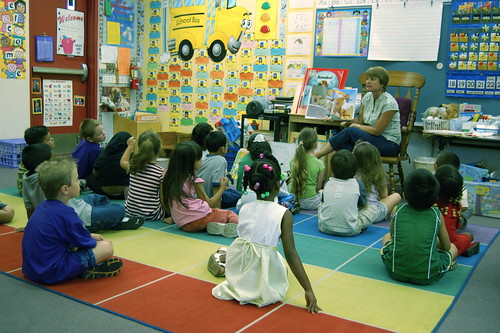Sunday, April 1, 2012
Choosing A Book to Read Aloud
Photo by Daveparker
I have been to my fair share of children's story times. I have heard librarians read aloud, teachers read aloud, babysitters, and parents. I am always intrigued to see what stories are chosen to be read aloud, particularly when it's librarians or teachers doing the reading. Often, I love the books that I listen to. But sometimes I'm left wondering, Why did they choose that book?
Today I'm posing the question: How do you chose a good story to read aloud? I am not the ultimate authority on this topic, but I do feel I have a little bit of expertise since reading aloud to small children is my job.
So here's how I chose a book to read aloud:
1. Get a good recommendation. Bookstores and libraries can be overwhelming if you're just browsing. Where do you even begin to look? Most good read aloud titles I find are inspired by reviews I read, Twitter feeds I follow, book lists, or just general buzz. So ask a librarian or book seller. Ask a teacher. Go poke around on Amazon, or the internet in general; you can find tons of "best of" lists to get you going on your hunt. Or, searching for new titles by an author or illustrator you already know you like can be a good starting point too!
2. Read the story aloud to yourself. How does it flow off your tongue? Is it awkward? Is it engaging and compelling? Do you want to keep turning the pages for more, or are you bored from the start?
3. Is the subject something that would interest your readers? This can be tricky if you are going into a cold read aloud in which you haven't previously met your listeners. But if you know you'll be reading to preschoolers, it's not too tough to venture a guess as to some topics they might find appealing, right? Stay away from titles that are nostalgic and are written more for grown-ups than kids. I'm not a big fan of I Love you Forever, or some of Patrick McDonnell's stuff for read alouds... unless I'll be reading to a group of grown-ups!
4. Make sure it's a format that's meant to be read aloud. One of my big pet peeves is seeing books like The Cat in the Hat or One Fish, Two Fish used for big, group read alouds. Don't get me wrong, Dr. Seuss has created some of the most amazing books to be read aloud; why do those never seem to be the ones used for read alouds? Save the limited vocab titles for reading one on one with your kiddos, especially those kiddos that are still mastering reading. That's my own opinion, at least.
5. Don't pick anything too long... unless it's really good! Most small kiddos won't stay attentive for very long, especially when you've got a bunch of them smushed together on a little reading rug (think mob mentality). My three year old son's attention span is slowly growing, but he has been able to sit for an entire Dr. Seuss book for a while now. Dr. Seuss titles can be long, but they are good! Happy Birthday to You! is one of my son's favorites.
The length thing is a real stumper for me when observing other readers' choices for read aloud books. You have to be a really engaging reader to successfully pull off a long book during a preschool story time. I've seen plenty of read alouds flop because the reader chose a really wordy book. Sometimes even I have lost interest part-way through. The text doesn't have to be short enough to fit on a post-it note, but just be mindful of length!
6. Chose a book with appealing illustrations. If you're reading picture books, the illustrations are just as important as the text. Kids aren't going to care about a great story if the illustrations are weird, boring, or just poorly done. Off the top of my head, I can't think of a story I loved that had poor illustrations. But there are some bad stories I can remember that also had sub-par illustrations. I know you're not supposed to judge a book by its core, right? But if I don't like the illustrations in a book for some reason, if they are just totally unappealing from the get-go, I won't even bother reading the text. I will just chose a different book. In my experience, bad illustrations usually = bad story. And the opposite usually holds true as well; if a book has amazing illustrations, you're probably going to get a great story as well!
I am dying to know what criteria you use for choosing a good read aloud, even if it's just with your own children at home. How do you pick???
Subscribe to:
Post Comments (Atom)







































No comments:
Post a Comment